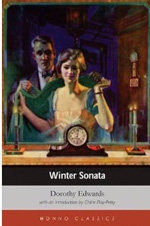
Dorothy Edwards apparently gave Winter Sonata a musical title because her love of music influenced the structure of the story, but I found myself thinking of the novel as a winter tapestry. Detailed descriptions of colours, patterns, and the vagaries of the weather feature largely in the story, and are an essential element of the book. The novel is set in a small village, and it begins just as the cold is about to take hold of the village and surrounding landscape.
Arnold Nettle, who has rather delicate health, comes to the village as a telegraph clerk in his uncle's Post Office to avoid suffering a winter in town. He very soon meets one of the two beautiful Neran sisters, Olivia, who lives with her younger sister Eleanor in a white house surrounded by pine trees overlooking the village. The Nerans' respectable middle class household is completed by an aunt, Mrs Curle, and her affable son George. Mr Nettle becomes quickly infatuated with Olivia but is always tongue-tied in her presence.
The family up at the white house are a social step up from the shy, awkward Mr Nettle who is graciously invited to play his cello for the family on occasional evenings. I felt sorry for the poor clerk as the family were snobbishly convinced that he wasn't as able to appreciate culture as they were. This is a quiet, delicate novel where very little actually happens but where the social interaction is woven finely into a nuanced picture to complement the shades of the winter landscape and weather.
I was particularly impressed with Edwards' observation of the sort of life that middle class women led and the ingrained social attitudes towards women. Both the Neran sisters are depicted as having very constrained lives in a limited environment and with very little to do each day. Eleanor is the younger sister and at seventeen not long out of school and relishing the beginning of adulthood. Yet the adults around her seem in various ways not to take her seriously as a woman and to regard her still as a child.
The exception is David Premiss, a visitor who flirts with her; yet at the same time his language is also belittling and infantilising. He refers to her as a ‘baby' and 'my own darling child' and says that reading will 'spoil your beautiful eyes'. When Eleanor and Premiss are having a conversation just before he leaves she is aghast to discover that he would happily allow a wife to serve him. She says, 'If men as clever as you are willing to be among the oppressors of women, what can one expect of ordinary men?' There was an interesting contrast between Premiss' attitudes and those of George Curle who describes the sisters to Nettle by saying, ‘you have no idea what good comrades they make'.
In some respects I found the novel to be a frustrating read because of its slow pace and the lethargy with which the novel is imbued. But I think that the author was intentionally creating that atmosphere to illustrate what stultifying lives women often led. As the novel continues Olivia slides further into depression and at times I wanted to shake her. But the reality was that few avenues were open to a respectable young single woman. Wintry conditions only add to the sense of isolation.
I feel that the real sadness of the novel, however, is that the author died so young and without fulfilling her
early literary promise. Her interest in writing of women's lives and condition would perhaps have led to many more
novels.

Honno Press (UK), paperback, 9781906784294
